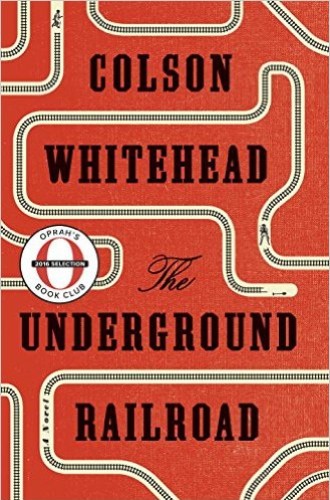The startling triumph of The Underground Railroad
Slavery is the sort of topic that makes novels seem trivial, even as it demonstrates in blood the power of a pernicious cultural fiction. Writing a novel about it—as Colson Whitehead has done, with startling success—is like taking a selfie in front of an active volcano: you’re lucky if you just get away with looking small.
Of course, great novels have been written about slavery, and this history adds another layer of risk to Whitehead’s project. Readers of The Underground Railroad may find themselves, rather ghoulishly, comparing it to Beloved, Kindred, Middle Passage, Flight to Canada, The Known World, or the great slave narratives of Harriet Jacobs, Frederick Douglass, or Solomon Northup—a caliber of competition few novelists would willingly invite. (That such a list can exist at all is white America’s shame and black America’s triumph.)
Another, far less significant history shadows this book as well: Whitehead’s history of writing novels that fail to live up to the memory of his 1999 debut The Intuitionist, which memorably applied the Thomas Pynchon/Don DeLillo mode—essayistic riffs unfolding alongside a slightly cartoonish plot driven by technology and politics—to the lives and conflicts of black Americans. As each new Whitehead book rolled through the literary publishing hype-machine, drawing its spate of admiring reviews—many of which, after the brilliant but frustrating sophomore effort John Henry Days (2001), featured some variation on the phrase “His best since The Intuitionist!”—it was hard to escape the feeling that his was a talent limited by its own cleverness.
The first surprise of The Underground Railroad is its style: muscular, understated, aphoristic. Whitehead has always been capable of devastating efficiency, but he’s never been so disciplined as here. “When you are sold that many times, the world is teaching you to pay attention,” Whitehead writes of Ajarry, his heroine’s grandmother; the single sentence distills whole shelves’ worth of knowledge and biographical reconstruction. A few pages later, Ajarry’s life is summarized as follows:
Her first master got swindled by a man who sold a device that cleaned cotton twice as fast as Whitney’s gin. The diagrams were convincing, but in the end Ajarry was another asset liquidated by order of the magistrate. . . . Another owner expired from dropsy, whereupon his widow held an estate sale to fund a return to her native Europe, where it was clean. Ajarry spent three months as the property of a Welshman who eventually lost her, three other slaves, and two hogs in a game of whist. And so on.
The “And so on” does more emotional work than whole paragraphs of earlier Whitehead books.
The efficiency of the language isn’t merely a technical achievement: it speaks to Whitehead’s thorough immersion in his research, his mastery of a hundred facts in search of the one that will make a scene come alive. More impressively, it speaks to his willingness to contemplate each of these facts from within the mind of trapped, terrified, resourceful Cora, the heroine of the book. Every sentence implies a network of details, practical, psychological, and technological, and every detail convinces. At one point Whitehead describes a slave auction: “Onlookers chewed fresh oysters and hot corn as the auctioneers shouted into the air.” Such is the authority of Whitehead’s narrative voice that, if I were to learn tomorrow that a consensus of historians thinks nobody in antebellum America ate oysters, I’d believe Whitehead rather than the historians. He has created a world that is complete, compelling, and intolerable, like our own.
One major detail—and it’s this detail that has dominated prepublication coverage of the book—is certainly not historical, and it initially seems a holdover from the kind of clever, high-concept novel Whitehead used to write: when Cora runs away on the underground railroad, she escapes on an actual, subterranean train. Knowing his earlier books, I assumed Whitehead was going to use this setup to riff on the Metaphorical Significance of Trains, the Essential Americanness of That Lonely Whistle, et cetera. Thankfully, it ends up serving mainly as a plot device that allows him to whisk Cora through a reimagined 19th-century American landscape at otherwise implausible speeds.
Each state to which Cora escapes illustrates yet another cul-de-sac of illusory racial progress: in one place, black people work at decent wages, in humane conditions, while the state secretly sterilizes them; another tries to end racial strife entirely by killing all the black people.
This is the novel’s last great risk: each place to which Cora escapes represents one possible vision of black marginalization, all of which have been realized, in various ways and to various degrees, in American history. The book threatens to thin out into dull allegory. But Whitehead keeps his vision trained on Cora—what she sees, smells, watches, and fears. He is always telling her story against a cleverly conceived backdrop, rather than letting the backdrop become the story.
None of this makes the book sound especially pleasurable to read, and yet I gobbled it up in two sittings. Cora is an imperfect, appealing heroine who has never forgiven her own mother for successfully running away. She is clever enough to keep the plot in motion, repeatedly outwitting recapture and death, and yet her hairsbreadth escapes don’t strain credulity, especially if you’ve read a few slave narratives. (The reader who has made it through Jacobs’s life, for example, knows that no amount of resourcefulness is too great to attribute to a successful runaway.) The result is an adventure novel of immense moral gravity. We don’t have to talk anymore about Colson Whitehead’s potential. With this book, we can start to talk about his achievement.







